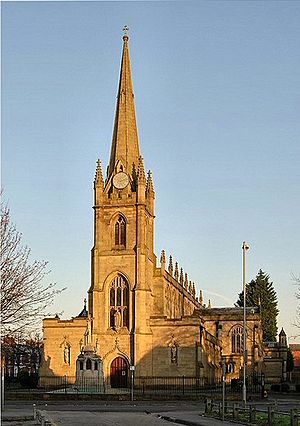Syro-Malabar Cathedral of St Alphonsa, Preston facts for kids
Quick facts for kids Syro-Malabar Cathedral of St Alphonsa |
|
|---|---|

Entrance from Meadow Street
|
|
| Lua error in Module:Location_map at line 420: attempt to index field 'wikibase' (a nil value). | |
| OS grid reference | SD5416929933 |
| Location | Preston, Lancashire |
| Country | United Kingdom |
| Denomination | Catholic (Syro-Malabar Catholic Church) |
| Tradition | East Syriac Rite |
| History | |
| Former name(s) | St Ignatius Church |
| Status | Cathedral |
| Founded | 1833 |
| Founder(s) | Society of Jesus |
| Dedication | Ignatius of Loyola |
| Architecture | |
| Functional status | Active |
| Heritage designation | Grade II* |
| Designated | 27 September 1979 |
| Architect(s) | Joseph John Scoles |
| Style | Gothic Revival |
| Groundbreaking | 1833 |
| Completed | 1886 |
| Administration | |
| Diocese | Eparchy of Great Britain |
The Syro-Malabar Cathedral of St Alphonsa is a special Catholic church in Preston, England. It belongs to the Syro-Malabar Catholic Church, which is a unique part of the Catholic Church. This church is the main cathedral for the Syro-Malabar Catholic Eparchy of Great Britain.
Before it became a cathedral, it was known as St Ignatius Church. It was part of the Diocese of Lancaster. You can find it near the center of Preston, with its entrance on Meadow Street. The church building first opened in 1836. It was the very first church in Preston to have a tall, pointed spire.
In January 2015, the church started being used by the Syro-Malabar Catholic Church. Then, in 2016, Pope Francis made it an official cathedral. He also chose Monsignor Joseph (Benny Mathew) Srampickal to be its first bishop.
Contents
History of the Church
How it Started
Long ago, before the Catholic Emancipation Act of 1829, it was hard for Roman Catholics to build churches. The first legal Catholic churches were often simple. They looked a lot like chapels used by other Christian groups. Sometimes, the priest's house was even part of the church building.
This church was originally started by a group called the Society of Jesus, also known as the Jesuits.
Building the Church
St Ignatius Church is one of the earliest examples of the Gothic style in Preston. This style looks like the grand churches from the Middle Ages. Work on the church began in 1833.
The architect who designed it was Joseph John Scoles. He also designed other important churches for the Jesuits, like the Church of the Immaculate Conception in London.
St Ignatius is one of the oldest Roman Catholic churches still standing in Preston. A famous expert on buildings, Sir Nicholas Pevsner, said it was important for the whole country. He also mentioned another Preston church, St Walburge, as being very special. He thought St Ignatius was planned in a very unusual way for its time.
The church was much smaller when it was first built. But in 1858, five new sections were added. These included a new main area for the altar (called the chancel) and smaller chapels on the sides. The architect for these changes was Joseph Hansom. He also designed St Walburge's church.
Later, in 1885–86, more changes were made by other architects. Areas for confession were moved to make space for two new chapels. The chancel was also redesigned. A new altar was made from a special stone called Hopton Wood stone. New confessionals were built outside the main walls. A third chapel, called the Sacred Heart, was added. Many beautiful figures and carvings were added by a company called Frank Tory of Sheffield. In 1912, another side chapel and a place for baptisms were added.
Church Life and Changes
The church had a close connection with St Ignatius Catholic Primary School, which is right next door. The school was built in 1863 and made bigger in 2000. Church services were often held for the school children.
Outside the church is St Ignatius Square. In 1982, this square was made a special "conservation area." This means that new buildings or big changes are not allowed. This helps keep the historic look of that part of Preston.
In 2001, the church no longer had its own priest living there. It joined with another church parish. For a while, Mass was held only once a week on Sundays. Later, in 2014, the church joined with even more congregations and was renamed the Parish of St John XXIII.
Becoming a Syro-Malabar Church
On December 2, 2014, the church was closed. But soon after, on December 31, 2014, something new happened. The leader of the Syro-Malabar Catholic Church, George Alencherry, asked the local bishop if his community could use a church in Preston. The bishop offered St Ignatius Church, and it was accepted!
Now, the church is open for private prayer and holds services in the Syro-Malabar rite.
Important People Connected to the Church
- The famous poet Francis Thompson was baptized at this church in 1859.
- Another well-known poet, Fr Gerard Manley Hopkins SJ, worked as a priest here in the late 1880s.
Gallery
See also
 In Spanish: Catedral de Santa Alfonsa (Preston) para niños
In Spanish: Catedral de Santa Alfonsa (Preston) para niños
 | Chris Smalls |
 | Fred Hampton |
 | Ralph Abernathy |





